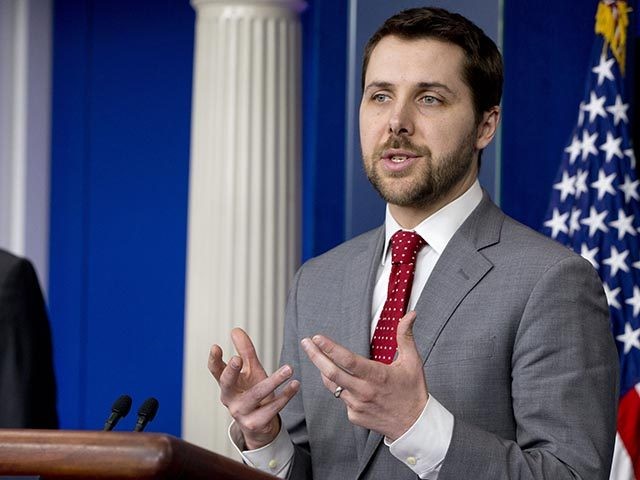China’s state-run Global Times applauded Joe Biden on Tuesday for choosing Brian Deese, a BlackRock executive, to lead his National Economic Council because his work let him witness “the sweetness of doing business with China.”
Deese served as a senior economic adviser to President Barack Obama, where he served as one of the loudest voices promoting left-wing climate change economic policies, including the promotion of solar and other renewable energies. This work made him a key voice in America’s signing of the 2015 Paris Climate Agreement, since withdrawn under President Donald Trump, and in climate talks with China, the world’s worst polluter.
At BlackRock, Deese is currently tasked with pressuring client companies to adopt onerous environmental restrictions. BlackRock, the world’s largest asset manager, aggressively promotes investment in China and recently received permission to open a mutual-fund business in Shanghai.
The Global Times applauded Deese as a choice as well as his nominee to be Treasury secretary, Janet Yellen, the former chairman of the Federal Reserve. The Times‘s Party-approved experts said they had “cautious optimism” about Biden’s future attitude towards China as president.
“[G]iven the known candidates as well as Biden’s style, the new team is unlikely to be chaotic and erratic in trade talks, though tensions will likely persist given their longstanding grievances over China, and intention to contain China’s rise,” the Global Times asserted. “They urged China to remain steady and consistent in its stance.”
One of the propaganda outlet’s “experts,” a “senior fellow” at a Chinese university, told the Global Times that Deese would “promote cooperation” with China because of his experiences at BlackRock.
Deese, he said, “represented the interests of large U.S. companies that ‘have tasted the sweetness of doing business with China,'” suggesting he had witnessed that alleged “sweetness” first-hand.
BlackRock, where Deese works as “Global Head of Sustainable Investing,” openly promotes foreign investment into China on its website.
“Much is changing in China, and the cost of ignoring this emerging opportunity might prove too high, especially over the longer term,” the website warns. “To help discover the opportunities these changes provide, you need a trusted partner who is not only an expert on China but can apply their knowledge, expertise and judgement in creating portfolios that can deliver the best of Chinese markets to you.”
“BlackRock’s large and experienced team can provide you with a truly differentiated perspective on China and our breadth of solutions across active and index strategies give you a multitude of ways to access the market,” the company offers.
BlackRock’s ability to offer guidance in working with the Communist Party expanded greatly in April, when it received approval to open a mutual-fund business within the communist state. The move, the Wall Street Journal reported at the time, “paves the way for the world’s largest asset manager to be one of the first foreign investment firms to start managing money for Chinese individuals.”
BlackRock’s increasingly close ties to China raised some alarms this year among those concerned that China is using America’s wealthy to expand its influence within the country. As Rupert Darwall noted in a column for RealClearPolitics in May, the asset manager — through Deese’s leadership, was “threatening to vote against boards that do not apply burdensome environmental reporting standards that have no statutory or regulatory standing … while being mute about Chinese companies’ lack of audit oversight and enforcement.”
“There could hardly be a more blatant case of double standards,” Darwall concluded.
Prior to working at BlackRock, Deese used his leverage in the White House to push for environmental regulations of American companies. Deese helped negotiate America’s role in the Paris Agreement, which would have forced American companies to significantly limit carbon emissions and adhere to other strict environmental restrictions. The Paris Agreement not only fails to impose those same limits on China, it actually allows for China to increase its carbon emissions for at least a decade.
Deese visited China in August 2016 for talks on climate change policy. Deese met with several senior Communist Party officials to “consult on key international climate change issues,” the White House noted at the time, “including the implementation of the Paris Agreement and our mutual efforts to secure an amendment to the Montreal Protocol and to adopt a market-based measure to reduce emissions from international aviation.”
Under Obama, Deese also promoted a plan to offer government subsidies for low-income poverty neighborhoods to install costly solar technology in homes, arguing that solar panels could help “households save money on their utility bills.” At the height of the economic crisis in the Obama era, Deese also played a role in cutting a deal to save America’s automobile industry that resulted in cut pensions for tens of thousands of auto workers and significant payouts for auto companies.
Reports suggested that Biden chose Deese to lead his National Economic Council on Monday.

COMMENTS
Please let us know if you're having issues with commenting.